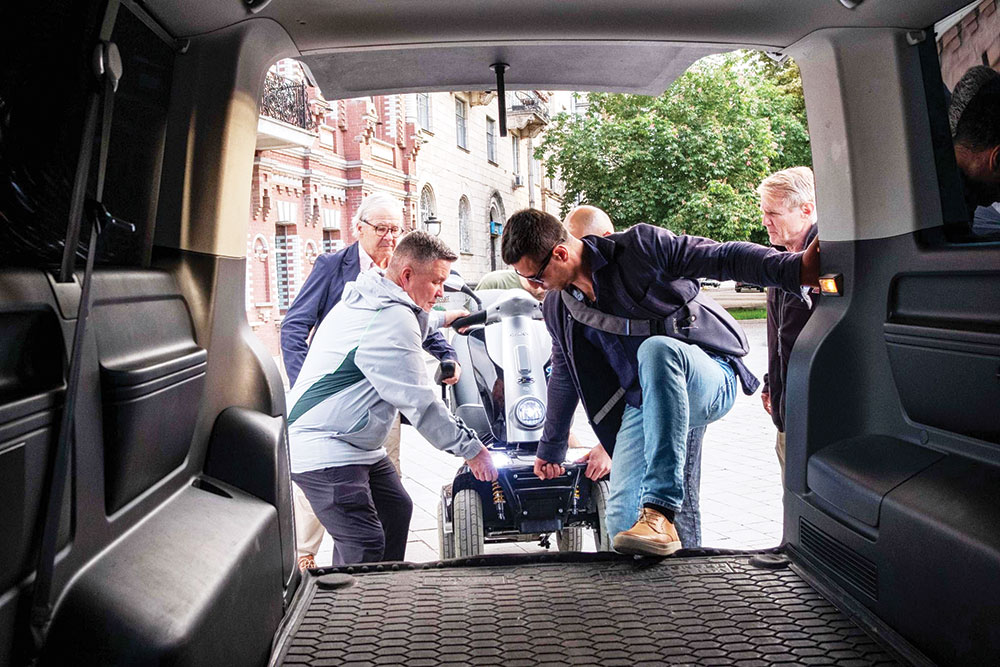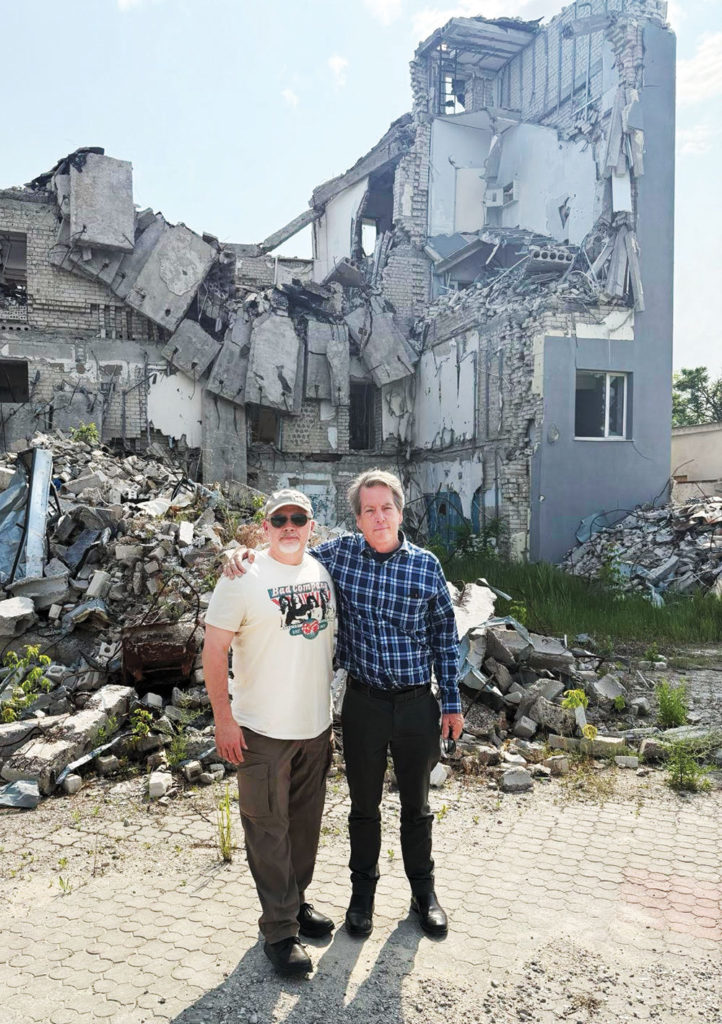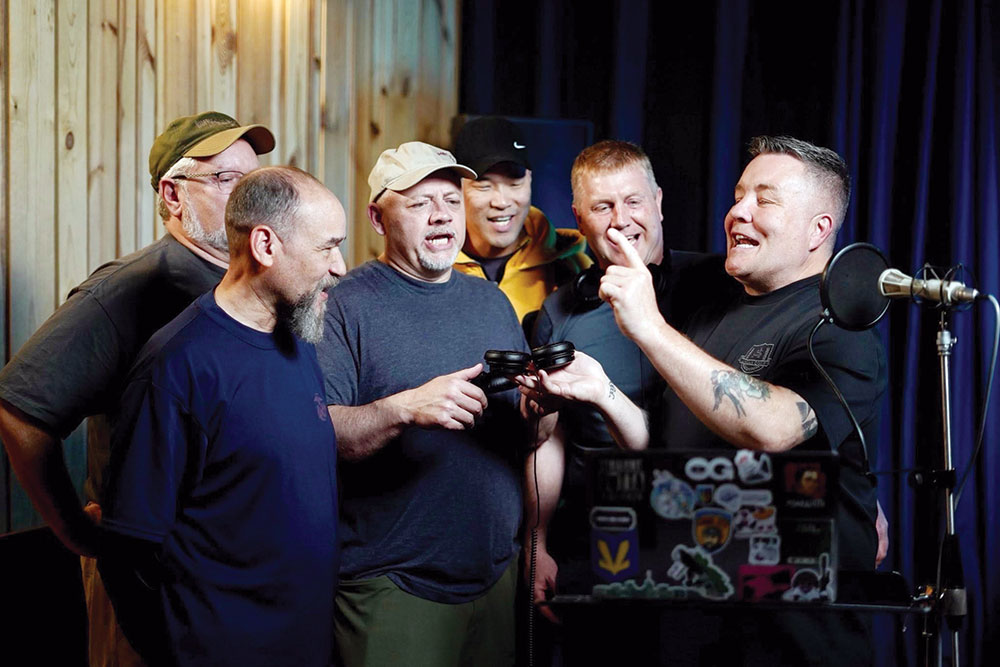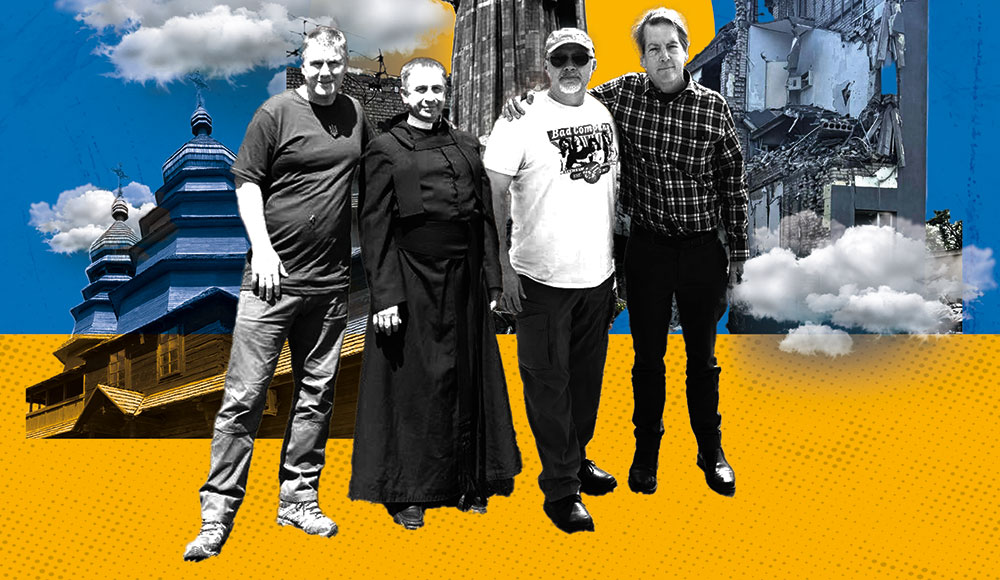The Ukrainian girls walking along the sidewalk outside Radio Tbilisi, a Georgian restaurant in the center of Kyiv, were at first startled when they heard a group of visitors speaking American English. “Amerikancy!” one said, and for a minute I tensed up.
To me, Ukrainians have every reason to be horrified by U.S. undercutting of the Ukrainian cause since last November’s elections. Instead, one girl about the age of my 10-year-old daughter Coco smiled brightly and said, “Hello!” and I think I heard her add “Thank you!” as she and her friends walked away.
Of all that I saw and heard and felt on a recent week-long trip to Ukraine as part of an aid convoy delivering medical supplies, from the whining Doppler cry of an incoming drone from our air-raid shelter in Odesa to obscene piles of spent Russian heavy-weapon shell casings on the road to Kherson to the hollowed-out voices of fighters for the Ukrainian cause who were held and tortured by the invading Russians, the sweet smile of that girl in Kyiv in a way haunts me most. It haunts me because, most every night, Vladimir Putin is trying to murder that girl about the age of my daughter. Or he’s trying to kidnap her, as the Russians have kidnapped thousands of Ukrainian children, and taken them back to Russia to try to strip them of their culture and heritage and their families.

As I sat down to write up this article last Monday, one of my Ukrainian guides on the trip sent me a video of that night’s vicious Russian assault on Kyiv, as she texted “All of Kyiv is on fire: fires are recorded in every district.” Her video, taken out her own window, showed parked cars far below, and the sound of a drone making its way toward a target, then first one and then another loud explosion. When I played the video for my daughter, who had asked what I was looking at, she jumped at the sound of that explosion, eyes wide.
Here are a couple of things to know about the war in Ukraine: The Ukrainians when they strike, as in their bold and highly successful drone assault on multiple air strips deep in Russian territory while I was in Ukraine, attack military targets in the vast majority of cases.
The Russians, in contrast, systematically target civilians, seeking in the murder of women and children to demoralize the Ukrainian population. And two: Putin does this with full knowledge that, as any visitor to Ukraine will tell you, it’s a fool’s mission, a wild, blundering-in-the-dark kind of move, since Ukraine will keep fighting, no matter what, even if their cities are overrun and they have to take to the hills or the sewers or a remote location where they pilot drones that wreak havoc.
As one Ukrainian told me, “One thing that Ukrainians do best is we can adapt to pretty much anything and make the best scenario out of the worst possible situation.”
That girl who smiled at me outside the Georgian Restaurant in Kyiv is the face of the war because these people are fighting for her future and we should be, too. We should be all in at their side not because the Ukrainians are a charity case whose plight should attract our sympathy but rather, because they are bad-ass idealists fighting for things that matter, the very things we as Americans once told ourselves we held dear.
I was in Ukraine working, not for adventure, researching a book proposal that we hope will launch a scripted film with actors to help tell the story of Ukrainian courage. I’ve written in these pages before about Denver Riggleman, the former Republican Congressman from Virginia who alienated his party by performing a same-sex marriage.

I consider Riggleman as authentic an American hero as they come. I met him in December 2020 when I was working on publishing a collection of essays called “Now What?: The Voters Have Spoken—Life After Trump.” It was a good collection, lauded in the San Francisco Chronicle as “an extraordinary new book” that “will be an important reference text for future generations trying to understand this moment in history.”
Riggleman’s essay in that book about QAnon was an explosion of energy, and led to his writing the New York Times bestseller The Breach: The Untold Story of the Investigation Into January 6th, which helped Riggleman become a regular on cable news. Maybe you’ve seen him. He has a refreshing kind of no-bullshit style and actually makes sense, which is hard to do on cable TV. Nicole Wallace for one loves him.
Riggleman in Ukraine was as struck as I was at the contrast between Russian hunting of women and children versus Ukrainian focus on military targets, even though that stark and clear difference often gets muddled in coverage of what’s happening. “I witnessed Russia targeting civilians instead of military-supported targets,” Riggleman summed up after we’d crossed into Moldova for our flights home, each of us heavy with emotion.
“Indiscriminate use of ‘kamikaze’ drones, artillery and glide bombs in heavily populated and forward areas is Russia’s MO. I find it interesting that we have an administration here in the United States that is either tacitly or outwardly supporting a murderous, terror-based, civilian-hunting regime like Russia.”
Riggleman and his partner, the bad-ass filmmaker Ken Harbaugh, brought me to Ukraine to help tell the story of teen girls who were brave in the fight to resist the Russian occupation of Kherson and helped resistance forces turn back the Russian side and take back their city. I actually got to meet the girls, which was amazing for me.
I try every day to teach my girls, 10-year-old Coco and 8-year-old Anais, a little bit about courage, and in Kherson these girls we met were teaching me about courage. I’m lucky to be helping Harbaugh and Riggleman get this amazing story out there, because I, for one, think we can learn a lot from the Ukrainians.
In Kyiv, we interviewed an American member of the International Brigade whose wounds took him more than a year to heal. I sat with him and his Ukrainian wife and got to know him a little, getting a sense of him as both very determined and very hurt. Then I walked with him from a hotel to Maidan Square in the center of Kyiv where thousands of flags remind a visitor of the thousands who have died fighting the invading Russians.
Tango, as we called him, looked down a lot, paused to collect his thoughts a lot, but he was composed and poised as he talked to Harbaugh and Riggleman and I about all his fellow fighters in the International Brigade who had died, some in his arms, as he patted their flags clean.
“I want America really to know that the people who are fighting here, regardless of the rhetoric that’s being spread by either side, we’re not doing this for money,” he told us. “We’re not doing this because we’re warmongers. We believe in the freedom of a certain people, and America was a nation exactly like that at one point, and if it wasn’t for the help of other nations, we wouldn’t be the country that we are today.”
In Ukraine, I heard late-night references from Ukrainians to Lafayette, the French general who played a decisive role on our side in the Revolutionary War.
On my flight to Poland, where I met Riggleman and walked together across the border into Ukraine, I was reading For Whom the Bell Tolls, by Hemingway, who may be scorned by some for the self-caricature he became, but knew something about putting himself on the line.
Hemingway spent about the same length of time in hospital—material he used in his novel Farewell to Arms— recovering from his wounds as a volunteer ambulance driver in Italy during World War I as Tango did, I’m pretty sure, and he was in the mountains of Spain during the Spanish Civil War, a conflict that we might want to study now as a useful example of a conflict whose allegiances were not always what they seemed.
Or think about the Kate Winslet movie Lee, which I flashed on several times in Ukraine, in which the former Titanic star plays war photographer (and former model) Lee Miller as she barged her way into the thick of the action in World War II and took iconic photographs that help us remember. I thought of her specifically when I was in an Odesa bomb shelter about a week ago, as I write, as a major drone strike hit, and the loud, concussive noises echoing in the streets took me back to the opening scenes of Lee. But this was no movie. This was real, very real. “Why does it matter?” is a question that film asks and the answer is: It matters because it matters.
“So standing aside now, when people need it most, is a slap in the face and a disgrace to our history and our heritage,” Tango told us. “So, please, stand up and support us. Continue to help us. We’re not going to quit. We just need your help.”
Here’s what I now know, because my new friends in Ukraine tell me it’s so: They care if we care. Every time we have a conversation about Ukraine, they care. If, as in the case of one new American friend, you use a screensaver picture on your phone of a young girl fighting against the Russian invaders, that’s a detail that helps inspire the Ukrainians. They need our dollars and our weapons and our intelligence information, but they would also like not to feel abandoned or forgotten. They feel like we’re all on the same side and they also need to hear that and to feel that we’re still here, or a lot of us anyway.
Something as simple as giving blood in a Kyiv military hospital, to help the Ukrainian cause with a pint that might save a life imperiled by a Russian attack, took on a deeper meaning to our Ukrainian hosts.
When I returned home to Santa Cruz, uneasy at the double vision of feeling still tied to Ukraine as I went about my normal life again, guy friends kept asking me about my “adventure” in Ukraine and I felt a little sickened and ashamed. Had I talked about it before I left as an “adventure”? Had I given the impression I saw it that way? If so, the me who returned was not the same me who left. For me now, to talk about the Ukrainians is a solemn duty in which my intense experiences in Kyiv and Odesa and Kherson had nothing at all to do with me and only matter to the extent that I can be a conduit.
To talk of adventure was to summon the specter of “war tourism,” to go barging off to a war zone, especially as the father of girls ten and eight who are my daily pride and joy, but my new friend Ian Miller, a force-of-nature nonprofit aid worker from New York, had a good answer to that. Ask Ukrainians about “war tourism” and they’ll say: What’s that? If you care enough to show up here, at least you care that much, and maybe you can help others care more.
The Ukrainians inspired me to talk to anyone I can about why I see helping them, in any way you can, as so, so important. This isn’t a competitive sport. You can also lament the unspeakable horror of what is now unfolding in Gaza, which I’ve visited twice. You can focus on what’s happening in the streets of California as I write, and replay that clip of our United States senator being cuffed, and boil a little more, but one thing we can do no matter what else we do is pay a little attention to what’s happening in Ukraine, day by day by punishing day, and, if it’s in our hearts, try to do something for the cause.

“Get off the sidelines,” Ian Miller says. “Americans at their best are doers, not spectators. While Russia’s army kills and maims over 1,000 Ukrainians per WEEK, don’t sit around watching and waiting for the U.S. government to do the right thing for Ukraine, because it very possibly might not.
Step up as a private individual with power and agency to save a life, a kid, a family, a soldier. Ask people who have been on the ground in Ukraine, like me and many others: what are the most life-saving ways to help? We’ll tell you: Ukraine Freedom Project, United24, and others.”
Or ask me, reach out to me via social media or email, and I’m happy to offer more suggestions. As my new friend Ken Harbaugh put it:
“What haunts about Ukraine isn’t the wail of air-raid sirens, or the kamikaze drones slamming into our position at the front. Those memories don’t keep me up at night. But the voices of ordinary Ukrainians do. The trauma is everywhere, an entire nation forced to suffer the unimaginable. Every time I sit down with another Ukrainian child, I have to brace myself. One little girl apologized for stuttering, explaining that she never had that problem before the Russians came and ‘took her to the basement.’ But these stories are also what keep me coming back. Because if Ukraine does not win, this war won’t stop here. Its horrors will spread. Russia’s neighbors know this. Americans need to understand it too. And it’s the same thing that draws me back, again and again.”
Steve Kettmann is a former staff reporter for New York Newsday and the San Francisco Chronicle who has reported from more than forty countries for publications including The New York Times, the Washington Monthly and Wired.com. He’s also the publisher of Wellstone Books and the author/coauthor of more than 15 books, including seven New York Times bestsellers.












FACT:
Ukraine’s democratically-elected leader was overthrown in a neocon-CIA coup in 2014, which is how Ukraine ended up with war-mongering Zelensky. But trust the peace-loving Good Times to promote the resulting war.
FACT:
The peace-loving Good Times 100% ignores the blatant sadistic Holocaust Israel inflicts on Palestinians — and Trump dragging us into supporting the horror.
FACT:
Israel has nukes (stolen from the US!) — but the US is forced to help Israel destroy Iran, even though Iran fully complied with Obama’s no-nukes inspections agreement, which Trump immediately tore up. WWIII hangs in the balance.
If the Good Times has said one word about any of this, please tell us where.
FACTS!!!
The people of Santa Cruz know the truth, and support the fight for freedom, support the independence of Ukrainian people, the right to determine their own future. I know this, because much of my family is Ukrainian. There’s more Ukrainian spoken in my household than English, and whenever others in Santa Cruz hear, they wish us well. They may not understand the
Maidan 2014 was one of the most beautiful protests and mass movements for the freedom I have ever had the honor to read about. I recommend Marci Shore’s book, The Ukrainian Night. Reading it, you can see the future that would happen in 2022. You can see the rise of Trump, the creep of fascism, in the pre-2014 politics in Ukraine, as has happened here. But when the state started to use violence to suppress democratic free speech, the entire country showed up to defend democracy, to categorically reject the use of violence by the state to suppress dissent. Ukrainians both won their freedom back from a Putin puppet, but when the president agreed to new elections in the Fall only to flee the country next day, that is the day that Russia invaded Ukraine the first time, and began violent assaults in the East.
Ukraine gives us a model of how to stand up for our democracy here in the US, even against far larger and wealthier foes. Ukraine is paying the price for their freedom, but they know the stakes and they make the choice bravely and deliberately. The longer we in the US avoid dealing with our devils, the larger a price we will pay. Learn the lessons of Maidan 2014.
Ukraine’s “freedom” is brought to us by the same people who bring us Palestinian “freedom.”
Most of the world now understands this.
Even Americans are connecting the dots. “Our” media censors are looking ever more foolish. Even the Good Times may be forced to come clean (to its credit, it tolerates critical comments… so far).
What pathetic propaganda. The US and NATO have sacrificed a generation of Ukrainian men in this proxy war. Ukraine is being run by literal Nazis and a corrupt President who suspended democracy years ago.
Z.
Total propaganda. The vast majority of Russian strikes are on military or military/industrial targets The Kiev government arrests people who publish video showing otherwise. It also arrests people who publish video of the actions of the TCKniki …those press gangs who shanghai men off of Ukrainian streets, men who would rather not fight Zelensky and NATO’s war. Finally the Ukrainians claim that the Russians have kidnapped ‘thousands’ of Ukrainian children, and yet at the recent meeting with the Russian side the could produce only 339 names of alleged kidnap victims. Kettmann was led around and fed Ukrainian propaganda which he willingly swallowed and is regurgitating here.
It’s sad to see how divided our country has become. Such non sensical comments pouring out the untruths we to often hear today. Thank you GT for letting this story be told. What’s happening in Ukraine is real and if we think it can’t happen in our country? Think again. Any insult towards the author Steve Kettmann is obviously shared like a arrow of hate not knowledge.
Israel lobby war criminals (Kagans, Nuland, etc.) overthrew the DEMOCRATICALLY-elected president of Ukraine.
So much for you woke war-mongers prattling on about “democracy.”
Are you also happy to have Trump get us into another war for Israel?
Funny how you people are so upset that long-ignored immigration laws are finally enforced, but you don’t seem to have a problem with Trump as a war criminal for Zionism.